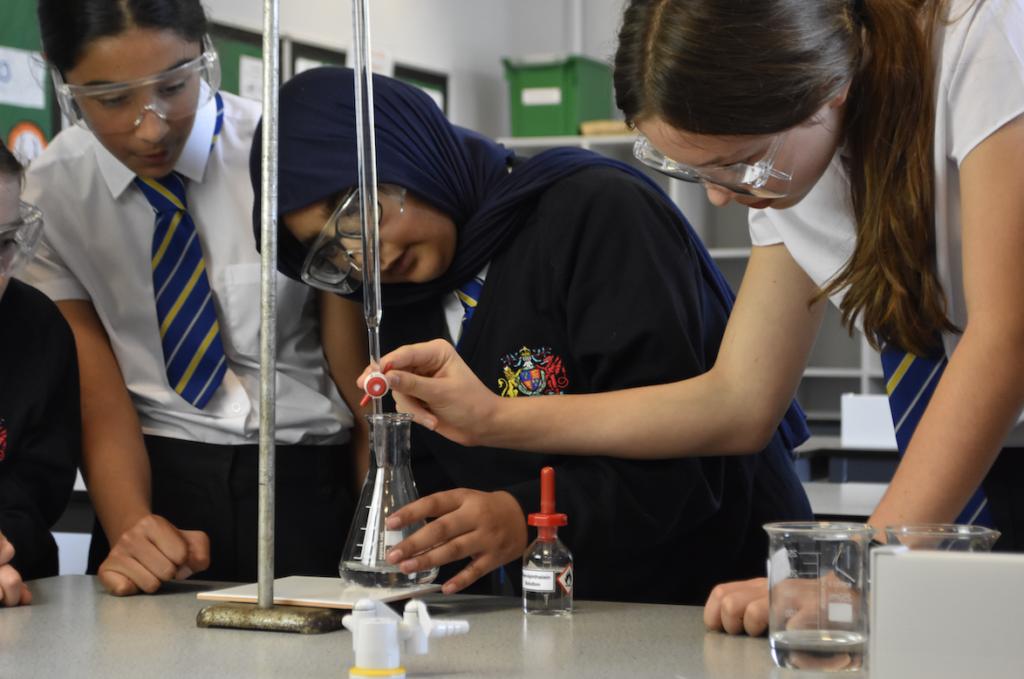The Mathematics department follows a linear GCSE course.
This course develops the work covered in Key Stage 3.
The scheme of work is organised into distinct topics to allow students to develop mathematical fluency in all areas of maths, but teaching will make connections between these topics to aid the development of mathematical reasoning and problem solving. The sequencing of the topics follows a sensible and logical order to ensure that students have the prerequisite skills to build upon prior knowledge at each stage of their learning. The prerequisite skills and connected topics will be referred to by teachers, and shared with students, at all opportunities.
Year 10
Autumn Term
Number Skills
Students will combine all of their number skills from KS3, in order to solve increasingly complex problems. They will specifically develop their knowledge of surds, bounds and standard form calculations.
Equations and Inequalities
Students will learn how to represent inequalities in a variety of ways and will use their algebraic knowledge to solve simultaneous equations.
Interpreting and Representing Data
Students will develop their knowledge of the multiple representation of data, with specific focus on the concept of cumulative frequency diagrams.
Fractions, Ratio, and Percentages
Students will explore the relationship between fractions and percentages and ratios.
Spring Term
Graphs
Students will learn how to solve equations and inequalities graphically, including simultaneous equations.
Sequences
Students will be introduced to increasingly complex sequences, including quadratic sequences, represented numerically and diagrammatically.
Angles and Polygons
Students will combine their algebraic knowledge with their geometric reasoning skills, in order to solve problems involving missing angles.
Trigonometry
Students will be given the opportunity to explore trigonometry in non-right angled triangles, including through the sine and cosine rules.
Summer Term
Area and Volume
Students will be introduced to the concept of volume and will learn how to apply the various formulae for finding the volume of 3D shapes.
Similarity and Congruence
Students will be introduced to the concept of mathematically similar shapes and will explore the link between linear, area and volume scale factors.
Probability
Students will develop their knowledge of probability from KS3, with a focus on the multiple diagrammatic tools available to represent probabilities. Students will be introduced to the concept of conditional probability.
Geometry Skills
Students will develop their construction skills and they will use these to solve loci problems.
Year 11
Autumn Term
Number
Students will further develop their number skills from year 10, focussing on the compound measures and proportional reasoning.
Algebra
Students will combine their knowledge of algebra in order to simplify algebraic fractions and solve a variety of problems through algebraic representation.
Shape and Space
All students will develop their use of formulae to solve problems, including problems involving 3D pythagoras and trigonometry. Some students will move on to using the sine and cosine rule in non-right angled triangles.
Probability and Statistics
The concepts of histograms and stratified sampling will be introduced to students at this stage.
Spring Term
Graphs
Students will develop their understanding of the visual representation of algebraic functions, including cubic and reciprocal functions, building upon the quadratic focus of year 10 graph work.
Geometry
All students will investigate mathematical movement through the use of vectors. Some students will combine their prior knowledge of angles to investigate circle theorems.
Summer Term
Exam Skills, Exam Practice and Revision
During this term students will review and revise all content, using assessment data to pinpoint key areas for development. Students will be provided with lots of opportunities to practise exam style questions, both in class and at home.
Assessment at Key stage 4
- Low-stakes diagnostic assessment at the start of key units of work, to ensure students have the prerequisite knowledge to succeed.
- Homework activities, both online and written, which are designed to consolidate content from within the classroom and allow for early identification of areas of concern.
- Summative assessments are introduced from the beginning of year 10 and take place every Term. These are designed to reflect real GCSE papers.
- Mock exams are completed twice in year 11, to inform planning and guide targeted intervention.
How can parents help support their child’s learning?
- Visit maths club on a Monday, Tuesday, Thursday and Friday lunchtime
- Use the ‘MyProgress’ section of MathsWatch
- Visit the learning base to ask for additional support with homework
- Visit the ‘Maths – Online Curriculum (years 7 to 10)’ Google Classroom, which provides an overview of the programme of study, with worksheets and video links for each topic.
- Complete practice papers online using MethodMaths.
Enrichment opportunities
- Regular participation in the UK Mathematics Trust Intermediate / Senior Maths Challenge
- Attendance at external competitions and enrichment events
- Students may be chosen to participate in Further Maths.
Regular participation in the UK Mathematics Trust Junior Maths Challenge.
GCSE course/s (exam board and code)
GCSE Mathematics 9-1
- Higher tier – Edexcel (1MA1)
- Foundation tier – OCR (J560)
![]()


